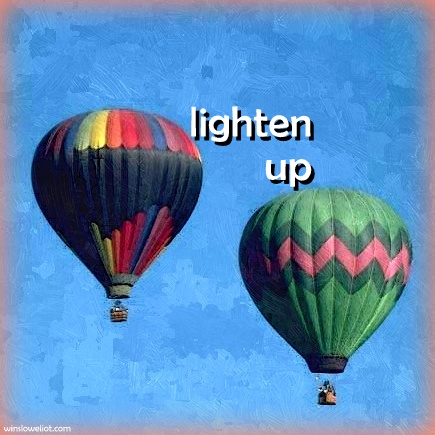
Stillness 11-13: One of my favorite books of short stories from when I was a child living in Greece is titled “One Day the Hodja.“ It’s a compilation of ancient classic tales of Middle Eastern origin that I later discovered show up in Sufi stories as well, with various names for the protagonist. In my book each story begins with the Hodja setting out on a mini-adventure. To this day, the stories never fail to brighten my day.
Here’s one literally about lightening up:
One day a man was walking home late one night when he saw the Hodja searching under a street light on hands and knees for something on the ground. “What have you lost?” he asked.
“The key to my house,” replied the Hodja.
The friend offered to help him look so they searched and searched under the light for the key. But they couldn’t find it, so the friend eventually asked, “Where exactly did you drop it?”
“Inside my house,” replied the Hodja.
His friend was astonished. “Then why are you looking for it here?”
“Because there’s more light here than inside my house,” the Hodja explained.
Levity is the opposite of gravity. When we levitate, we “rise by virtue of lightness,” according to the Latin source of the word. We lighten up on our pull toward density and matter in all form. When we lighten our energy our spirit becomes buoyant and springy. Children levitate all the time–you see them bouncing on their toes, hopping and skipping, peering and chuckling, throwing a tantrum and cheerfully letting it go like a cloudburst on a summer day.
As we grow up, we get more serious. We also get harder, more dense, and tend to hold onto tantrum, weight, and feeling. But we don’t have to! Daydreaming, laughing out loud, loving our heart out, and dancing are just some ways we can lighten up. The Hodja stories, too, remind us not to take things–and especially ourselves–too seriously.
Now I remember another Hodja tale. Do you ever feel as though you’re being asked to do something you’d rather not? This is how the Hodja dealt with a neighbor he wasn’t overly fond of who wanted to borrow a rope from him:

One day a neighbor whom the Hodja did not like asked him for the loan of his rope. The Hodja went into the house, and after a time came back and said: “Sorry, the rope is not available. My wife is spreading flour on it.”
“What do you mean?” asked the surprised man. “How can flour be spread on a rope?”
“It’s quite easy,” replied the Hodja. “When I don’t want to lend my rope, flour can easily be spread on it.”
And here’s one of my favorites, also concerning an annoying neighbor:
One day th e Hodja borrowed a huge pot from his neighbor. The very next day he returned it with a smaller pot inside. When the neighbor asked him about it, he said:
e Hodja borrowed a huge pot from his neighbor. The very next day he returned it with a smaller pot inside. When the neighbor asked him about it, he said:
“Ah, I forgot to tell you. you pot gave birth to that small one while it was with us.”
His neighbor was amazed, but gladly accepted both the explanation and the baby pot.
Some days later the Hodja asked if he could borrow the same large pot from his neighbor, who very happily lent it to him again. But this time several days had passed by and there was no word from the Hodja. After waiting for a few more days, the neighbor went around to the Hodja’s door.
“Hodja Effendi, what has happened to that pot I lent you?” he asked.
“Why, didn’t you hear the sad news?” the Hodja replied. “Your pot died the very night I borrowed it from you!”
“Come now, Hodja Effendi, you don’t expect me to believe that a pot can die, do you?”
The Hodja was very indignant. “You believed me when I said it had given birth to a baby pot, but now that I say it’s dead, you accuse me of lying!”
